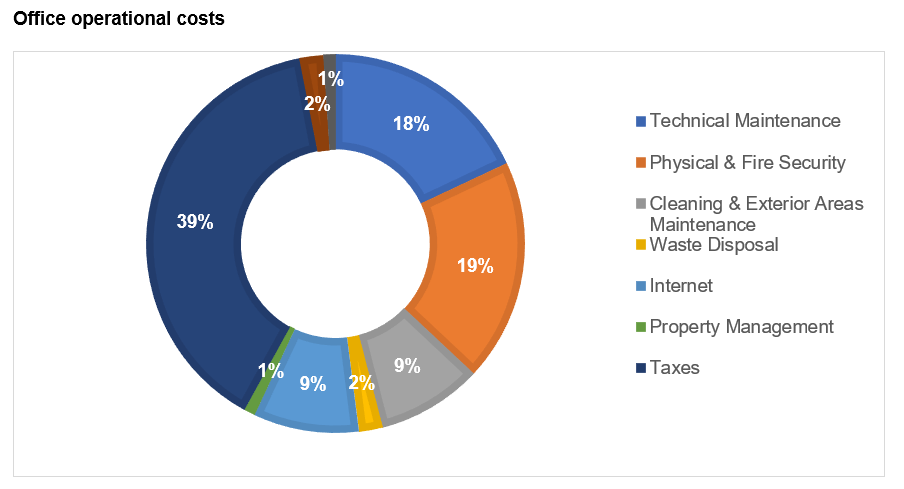European Outlook 2026
The office occupancy costs in Bucharest have increased by approximately 10% over the past two years, being driven by the growth in operational costs and by the rent indexations in a period with high inflation. The most significant factors impacting operational costs have been the rise in the minimum wage and the increased return of employees to offices, according to an analysis of the Cushman & Wakefield Echinox real estate consultancy company. The analysis in question is based on the projects managed by the company.
Smaller office buildings have experienced a more pronounced increase compared with larger ones, as the latter benefit from portfolio economies of scale. By streamlining resources and suppliers across multiple buildings, larger portfolios can reduce overall costs.
Operational costs are expenses incurred by tenants which are added to the rent and together compose the occupancy costs.
 Mihaela Petruescu, Partner Asset Services at Cushman & Wakefield Echinox: “The building operational expenses remain a primary concern for property managers. Maintaining these costs at a competitive level, while meeting the tenants’ needs and ensuring quality standards, yet adhering to the landlords’ financial projections, is a constant challenge for management teams. A proactive approach from property managers is crucial, as it will ultimately determine a building’s performance and its overall appeal. Tenants carefully consider both operational costs and service quality when deciding to lease new space or when renewing their existing contracts.”
Mihaela Petruescu, Partner Asset Services at Cushman & Wakefield Echinox: “The building operational expenses remain a primary concern for property managers. Maintaining these costs at a competitive level, while meeting the tenants’ needs and ensuring quality standards, yet adhering to the landlords’ financial projections, is a constant challenge for management teams. A proactive approach from property managers is crucial, as it will ultimately determine a building’s performance and its overall appeal. Tenants carefully consider both operational costs and service quality when deciding to lease new space or when renewing their existing contracts.”
Operational costs include property tax, technical maintenance, insurance, cleaning services, physical and fire security, internet services and property management.
Property taxes, which can represent up to 50% of the total operating expenses, account for the largest share.
Another notable factor contributing to the rise in operational costs has been the increase in waste disposal, driven by higher building occupancy rates. The effective utilization rate of office spaces now exceeds 50%, up from 15-20% in 2022, in some cases being as high as 75%.

Alina Dima, Director of the Asset Services Department at Cushman & Wakefield Echinox: “To optimize costs and support the tenants’ ESG objectives, our property management team has implemented several measures in the buildings we are currently managing. These include monitoring and controlling utilities’ consumption, ensuring efficient waste collection and regularly assessing supplier performance. Simple methods such as tracking weather forecasts and the calendar of public holidays, as well as monitoring the presence of the employees in the office, can also yield considerable savings. For instance, public holidays account for nearly a month during every year, allowing us to optimize costs during these particular periods.”
Furthermore, by closely keeping track and adhering to preventative maintenance schedules, long-term cost savings can be achieved by reducing repair expenses, avoiding premature equipment replacement and minimizing the risk of tenant disruption.

The Cushman & Wakefield Echinox Asset Services team manages 14 real estate projects with a total area of over 450,000 sq. m and a market value nearing €500 million nationwide. These projects serve 150 tenants from various industries. In Bucharest, the company oversees several iconic office buildings such as Expo Business Park, Floreasca Park and Țiriac Tower, with operational budgets exceeding €9.5 million.





